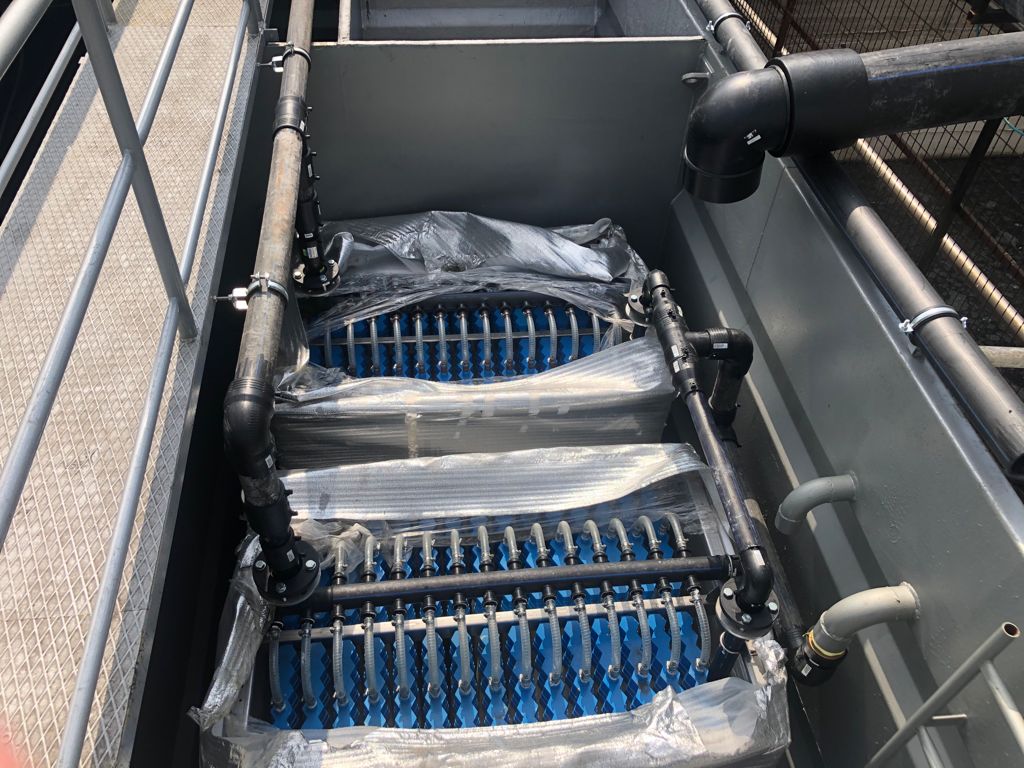Ovacık Mahallesi, Kullar Caddesi No: 241 C1 Blok, 41000 Başiskele/Kocaeli
Membrane Bio-Reactor Systems (MBR)

Membrane Bio-Reactor Systems are advanced form of activated sludge systems. These systems are a combination of biological reactors and membrane technology. After biological treatment instead of using a secondary clarifier Ultrafiltration or Microfiltration membranes are used for separation phase.
IMPORTANCE OF MEMBRANE TREATMENT SYSTEMS
Membrane technologies are gaining popularity due to their low area requirement and high efficiency in treatment.
PURPOSE OF MEMBRANE TREATMENT SYSTEMS
High-rate removal of biodegradable materials, microbes, turbidity, particles, surface-active materials.
DETAILS OF MBR TREATMENT SYSTEMS
Membrane Bio-reactor type (MBR) treatments use latest composition of ultrafiltration and aerobic biological treatment reactor technologies.
Submersible membranes can be placed inside a biological reactor or external membranes utilizing positive pressure can be applied in this technique. Wastewater from biological treatment passes through the membrane resulting filtration of particles smaller than 0,2 microns.
Solids larger than this size such as microorganisms and particles are removed from wastewater. Continuous flow on filter surface prevents clogging and EPS formation. If an instance occurs where particles stick to membrane filter surface, periodic backwash with treated wastewater and chemical rinsing will clear membrane surface both physically and chemically. The water used in backwashing along with chemicals used for rinsing flows to biological tank to be treated.
MBR technique provides high treatment efficiency while eliminating need of secondary clarifier. Also, due to high surface area to volume ratio provides 3 times lower area requirement for aeration tank when compared to conventional biological treatment. This results in 70% reduction on layout area and construction fields.
VARIOUS MBR TREATMENT FIELDS
- Advanced treatment of domestic and industrial wastewaters
- Instances where receiving environments are river basins
- Treatment of high pollution wastewater
- Treatment trains resulting in irrigation and water reclamation
- Projects where area is limited for conventional techniques
- Projects where capacity increase results in treatment plant being insufficient
- Water reclamation for processes with high water consumption
Most important criteria on membrane selection is membrane flux. One other factor is cost. Depending on the wastewater type membrane selection can change. If treated water is going to be reclaimed, membranes with better effluent quality can be chosen. On large scale plants cheaper membranes can be utilized to reduce cost. Also, membranes should not be inclined to clog and they should be easily cleanable.
Nitrogen removal can be done in MBR systems. Before aeration, anoxic tank can be installed. Even without anoxic tank due to high biomass concentrations some parts of aerobic tank become anoxic. This results in better nitrogen removal than conventional activated sludge systems.
MBR Systems Successfully Applied:
- Wastewater recycled for irrigation purposes. (Bacteria and solid particle treatment)
- Wastewater recycled for industrial purposes. (Nanofiltration, reverse osmosis, pre-treatment for UV and ozone)
- Capacity increase on conventional treatment plants. (Increase in sludge concentration)
- Area conservation in new treatment plants. (Increase in sludge concentration and no requirement for secondary clarifier)
ADVANTAGES AND DISADVANTAGES OF MEMBRANE BIO-REACTOR SYSTEMS
Among many advantages of MBR systems, high efficiency on organic matter removal, treatment of difficult waters, low sludge production, high disinfection capability of effluent, high load rates, less polluted sludge production, treatment stability of nutrients and low area requirement can be noted as most significant.
Aside from that, there are also disadvantages of MBR systems. Most inhibiting factor in application MBR treatment system is related to first investment and operational costs (electricity consumption, duration of membrane operation). This fact causes a disadvantage in treatment of large volumes of wastewaters. Secondly MBR systems would be more applicable when discharge standards are strict or when water is going to be reclaimed.
This technology will be more affordable as membrane process cost decreases.

